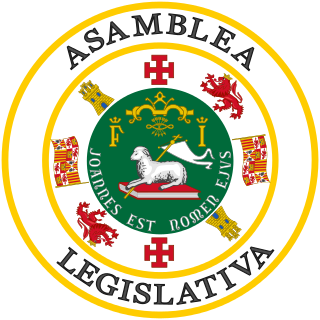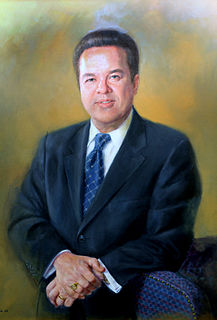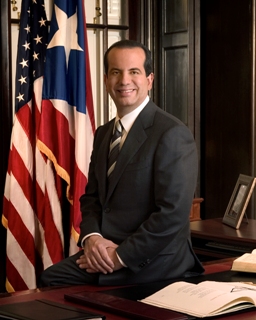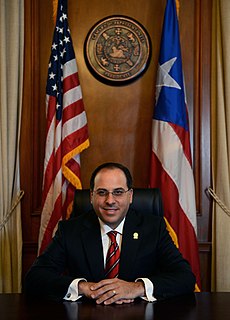The 2006 Puerto Rico budget crisis was a political, economic, and social crisis that saw much of the government of Puerto Rico shut down after it ran out of funds near the end of the 2005–2006 fiscal year. The shut down lasted for two weeks from 1 May 2006 through 14 May 2006, leaving nearly 100,000 public employees without pay and closing more than 1,500 public schools.
The crisis was publicly criticized by the business sector, non-profit organizations, Puerto Rican celebrities, and the general public (by means of opinion polls), and was described as the consequence of a political power struggle between the Commonwealth's main opposing political parties: the Popular Democratic Party and the New Progressive Party.
In April 2006, Governor Anibal Acevedo Vilá (PPD) announced that the central government of Puerto Rico did not have enough cash flows to pay projected operating expenses for the months of May and June, including the salaries of thousands of public employees. The governor asked the Legislative Assembly of Puerto Rico to approve an emergency loan of over US$500 million so that the government would use to continue to run, which then the government would repay using 1% of a newly proposed sales tax, or else the Governor would order a partial shutdown of central government operations, including the closing of numerous agencies.
The Puerto Rico Government Development Bank offered to supply the loan, but insisted on a tax reform plan that requires this new tax to be collected with a predetermined rate or amount be set aside exclusively for the loan repayment. The NPP-majority Senate approved the loan based on the proposed tax rate, but the NPP-majority House of Representatives refused to do so.
In a televised address on 27 April, Governor Acevedo Vilá announced that most of the government agencies would be shut down beginning 1 May, and would remain closed unless the House approved the economic plan. Government activities relating to health and security (including hospitals and police stations) would remain open, although medical professionals questioned whether hospitals would function if staff went unpaid and also raised the issue of government-funded prescriptions, whilst private security firms on contract to the government said they might cease work if the government did not pay what it owes them. [1]
Senate President Kenneth McClintock said that the shutdown was unnecessary since the government had enough funds to continue paying public workers until the first week of June and that under no circumstance should public schools be shut down. [2] NPP President Pedro Rosselló said he did not think Governor Acevedo Vilá would shut down the government and accused him of trying to create "uneasiness" [1] and "intimidate the Legislature". [3]
A public demonstration against the shutdown, named the Puerto Rico Shouts march, attracted thousands of people on 28 April. [4] Later on, labor leaders called for a general strike [1] if the shutdown occurred.
In a referendum held on 10 July 2005, Puerto Rican voters overwhelmingly approved the change to a unicameral legislature by 456,267 votes in favor versus 88,720 against, although three-quarters of voters chose to abstain. This change would become effective in January 2009 if an additional referendum were held to specifically amend the Puerto Rican Constitution and tailor it to the new legislative body, which is highly unlikely since the House defeated a Senate-passed proposed constitutional amendment.
On 1 May 2006, with the House of Representatives, the Senate, and the Governor having failed to reach an agreement, 45 government agencies, including island public schools, closed and 15 others were partially closed, leaving 95,762 people temporarily unemployed. [5] The only agencies remaining open are security related, such as police and firefighter agencies, and health related agencies. 1,600 public schools were shut down, leaving 500,000 pupils without facilities. [6]
On 2 May the shut down continued. The New Progressive Party held a meeting and decided to stick with the 5.5% tax proposal, stating that there wouldn't be any type of negotiation. Another meeting between the Speaker of the House of Representatives and the Governor ended in dispute with the Governor leaving less than 15 minutes after the meeting started. Protests were held also in front of the main offices of Popular, Inc. in Hato Rey and the Capitol.
On 3 May, Governor Acevedo Vilá accepted an invitation by José Aponte, Speaker of the House, to meet with him alone in the Capitol. Acevedo Vilá suggested to Aponte that Senator Kenneth McClintock, President of the Senate, should be present. Aponte didn't agree. Acevedo Vilá arrived to the Capitol in company of Alfredo Salazar, the President of the Puerto Rico Government Development Bank, Juan Carlos Méndez, Secretary of Treasury, and Aníbal José Torres, Secretary of Government.
Aponte, as agreed, asked Acevedo Vilá to meet alone with him. Fifteen minutes after the meeting Acevedo Vilá left abruptly. According to Acevedo Vilá, Aponte began to complain at some point during the meeting, specifically mentioning that a few days earlier, the Secretary of Treasury changed the financial numbers given under oath in a public hearing, and that the Secretary was absent in a meeting one week earlier, making it difficult for the House to reach him. At some point during the meeting, Acevedo Vilá noticed a smiling face in Aponte and commented that he was happy to see him smile during such time of crisis.
At this point, versions differ. Allegedly, Aponte told Acevedo Vilá that he has "seen the face of distress" of Acevedo Vilá in recent days, and that if he needed a handkerchief for his tears, he could let him know. At that point Acevedo Vilá left, feeling that "it was an insult to the Puerto Rican people left in the streets". Aponte denied this, and accused the Governor of lying.[ citation needed ]
On 4 May, Acevedo Vilá marched from La Fortaleza, the Governor's house, to the Capitol. It was the first time in Puerto Rican history that such an event has happened. In Puerto Rican custom, the Governor walks from the Capitol to La Fortaleza when he takes the oath of office. Acevedo Vilá was criticized due to the similarities between this march and an episode of the TV series The West Wing , in which the President of the United States (portrayed by Martin Sheen) walks from the White House, home of the President, to the U.S. Capitol, home of the U.S. Congress, in order to resolve a federal budget crisis.
On 8 May, Moody's downgraded Puerto Rico's general obligation debt to Baa3 from Baa2, and appropriation bonds to junk status at Ba1 from Baa3.
On 4 May, the first signs of compromise emerged as the Senate approved a new budget-balancing package which proposed a 5.9% sales tax and a corporation tax to be placed only on corporations with earnings of more than ten million dollars. [7] This deal was still not approved by the House. An emergency commission was formed on 8 May under the Archbishop of San Juan, which negotiated with the Governor, the Legislature and the banks. [8]
It reported on 10 May and brokered a deal which was accepted in the early hours of the following morning. Under the deal, the legislature will approve the emergency loan to finance Puerto Rico's $740 million shortfall. [9] Having won approval by the Legislature, the Governor signed the budget-balancing package into law on 13 May, officially ending the shutdown.[ citation needed ]
The Legislature has since approved a sales and use tax, with a portion set aside for repaying the loan. The NPP leadership insisted on a maximum combined sales tax of 5.5% (4% state and 1.5% municipal), but the NPP team working on the proposed legislation botched the document and placed wording in it that made the state sales tax 5.5%, for a total of 7%. The Senate immediately recognized the error and placed the bill for immediate approval.
Once it was approved, it was revealed that no Senators from the Rosselló faction of the NPP had read the bill, and they had approved with their votes exactly what Governor Acevedo Vilá wanted. The House then attempted to block the bill from reaching the Governor for his signature, but the Puerto Rico Supreme Court ordered the Speaker to complete the process. Just prior to the beginning of the sales tax enactment on 15 November, former Governor Carlos Romero Barceló filed a lawsuit attempting to derail the initiation of the tax, but that too failed to gain any traction in the Courts, and businesses began collecting the new tax on 15 November.

The politics of Puerto Rico take place in the framework of a democratic republic form of government that is under the jurisdiction and sovereignty of the United States Congress as an organized unincorporated territory. Since the 1898 invasion of Puerto Rico by the United States during the Spanish–American War, politics in Puerto Rico have been significantly shaped by its status as territory of the United States. The nature of Puerto Rico's political relationship with the United States is the subject of ongoing debate in Puerto Rico, in the United States, the United Nations and the International Community, with all major political parties in the archipelago calling it a colonial relationship.

The government of Puerto Rico is a republican form of government with separation of powers, subject to the jurisdiction and sovereignty of the United States. Article I of the Constitution of Puerto Rico defines the government and its political power and authority pursuant to U.S. Pub.L. 82–447. Said law mandated the establishment of a local constitution due to Puerto Rico's political status as a commonwealth of the United States. Ultimately, the powers of the government of Puerto Rico are all delegated by the United States Congress and lack full protection under the U.S. Constitution. Because of this, the head of state of Puerto Rico is the President of the United States.

Carlos Antonio Romero Barceló was a Puerto Rican politician who served as the governor of Puerto Rico from 1977 to 1985. He was the second governor to be elected from the New Progressive Party (PNP). He also served 2 terms in Congress as the 16th Resident Commissioner of Puerto Rico from 1993 to 2001.

Pedro Juan Rosselló González, is a Puerto Rican physician and politician who served as the governor of Puerto Rico from 1993 to 2001. He was President of the New Progressive Party from 1991 to 1999 and 2003 to 2008, and served as Senator for the District of Arecibo from 2005 to 2008. His son, Ricardo was also Governor of Puerto Rico from 2017 to 2019.

The New Progressive Party is a political party in Puerto Rico that advocates statehood. The PNP is one of the two major parties in Puerto Rico with significant political strength and currently holds both the seat of the governor and of the resident commissioner.

The 2004 Puerto Rican general elections took place on Election Day, Tuesday, November 2, 2004. After a count by the State Commission of Elections, the winner was inaugurated to a four-year term as Governor of Puerto Rico on January 2, 2005.

The Legislative Assembly of Puerto Rico is the territorial legislature of the Commonwealth of Puerto Rico, responsible for the legislative branch of the government of Puerto Rico. The Assembly is a bicameral legislature consisting of an upper house, the Senate normally composed of 27 senators, and the lower house, the House of Representatives normally consisting of 51 representatives. Eleven members of each house are elected at-large rather than from a specific legislative district with all members being elected for a four-year term without term limits.

Luis Guillermo Fortuño Burset is a Puerto Rican politician who served as the governor of Puerto Rico, an unincorporated territory of the United States, from 2009 to 2013.

Kenneth Davison McClintock-Hernández is a politician who served as the twenty-second Secretary of State of Puerto Rico, one of the four longest serving in that post. McClintock served as co-chair of Hillary Clinton’s National Hispanic Leadership Council in 2008, he co-chaired her successful Puerto Rico primary campaign that year and served as the Thirteenth President of the Senate of Puerto Rico until December 31, 2008. He chaired Luis Fortuño’s Incoming Committee on Government Transition in 2008 and the Outgoing Committee on Government Transition in 2012, the only Puerto Rican to serve in both capacities. He was sworn into office as secretary of state on January 2, 2009, by Chief Justice Federico Hernández Denton, fulfilling the role of lieutenant governor in the island.

Roberto Octavio González Nieves, O.F.M., is the leader of the Roman Catholic Church in Puerto Rico and the current Archbishop of San Juan.
The 15th Legislative Assembly of Puerto Rico met from January 2, 2005, to January 1, 2009. All members of the House of Representatives and the Senate were elected in the General Elections of 2004. The House and the Senate both had a majority of members from the New Progressive Party. It was the second time in Puerto Rican history in which the majority of the Assembly was from a different party than of the Governor of Puerto Rico.

The 2006 New Jersey state government shutdown was the first shutdown in the history of the U.S. state of New Jersey. The shutdown occurred after the New Jersey Legislature and Governor Jon Corzine failed to agree on a state budget by the constitutional deadline. Furthermore, Corzine and the Legislature clashed on the issue of raising the state sales tax to help balance budget. Exercising his constitutional powers as governor, Corzine ordered the shutdown as a means of pressuring the Legislature to pass a budget. The shutdown began at midnight on July 1, 2006, when Corzine called for an orderly shutdown of non-essential government services, which was followed by a second round of shutdowns three days later on July 4.

The 2008 Puerto Rican general elections were held on Tuesday, November 4, 2008 to elect the officials of the Government of Puerto Rico that would serve for the next four years, most notably the Governor of Puerto Rico.
Attorney Ángel Viera Martínez was a prominent pro-statehood public servant in Puerto Rico during the second half of the 20th century.
José Luis Dalmau Santiago is an attorney and politician. He is the current President of the Senate of Puerto Rico and President of the Popular Democratic Party.

The 2008 Puerto Rico gubernatorial election, took place on November 4, 2008 as part of the Puerto Rican general elections. It coincided with the 2008 United States general elections. Then-incumbent governor Aníbal Acevedo Vilá, Democratic, PPD was eligible for reelection, and ran for a second four-year term. His opponent, Luis Fortuño, Republican and PNP Resident Commissioner of Puerto Rico, defeated him. As of 2021, this is the last time a governor was elected in Puerto Rico by a majority instead of a plurality.

Aníbal Salvador Acevedo Vilá is a Puerto Rican politician and lawyer. He served as the governor of Puerto Rico from 2005 to 2009. He is a Harvard University alumnus and a graduate of the University of Puerto Rico School of Law, where he obtained his Juris Doctor degree. Acevedo Vilá has held various public service positions in the Puerto Rico government under the Popular Democratic Party, serving as a member of the House of Representatives of Puerto Rico (1993–2001) and as the 17th Resident Commissioner (2001–2005), before he was sworn in as Governor on 2 January 2005. Acevedo Vilá was also a member of the National Governors Association, the Southern Governors' Association and the Democratic Governors Association, and a collaborator of President Barack Obama's presidential campaign. Also he is currently an adjunct professor of the University of Puerto Rico School of Law. He unsuccessfully ran for Resident Commissioner of Puerto Rico in the 2020 elections for the Popular Democratic Party.

The Office of Management and Budget of Puerto Rico —Spanish: Oficina de Gerencia y Presupuesto de Puerto Rico (OGP)— is a Cabinet-level office, and the largest office within the Office of the Governor of Puerto Rico. The main job of the office is to help the governor prepare the budget. The office also measures the effectiveness of agency programs, policies, and procedures and see if they comply with the governor's policies. Its current director is Jose I. Marrero Rosado.

The Popular Democratic Party is a political party in Puerto Rico that advocates to continue as a Commonwealth of the United States with self-governance. The party was founded in 1938 by dissidents from the Puerto Rican Liberal Party and the Unionist Party and originally promoted policies on the center-left. In recent years, however, its leaders have described the party as centrist.

Jaime R. Perelló Borrás is a Puerto Rican politician. Perelló is affiliated with the Popular Democratic Party of Puerto Rico and the Democratic Party of the United States. He was the 30th Speaker of the House of Representatives of Puerto Rico.